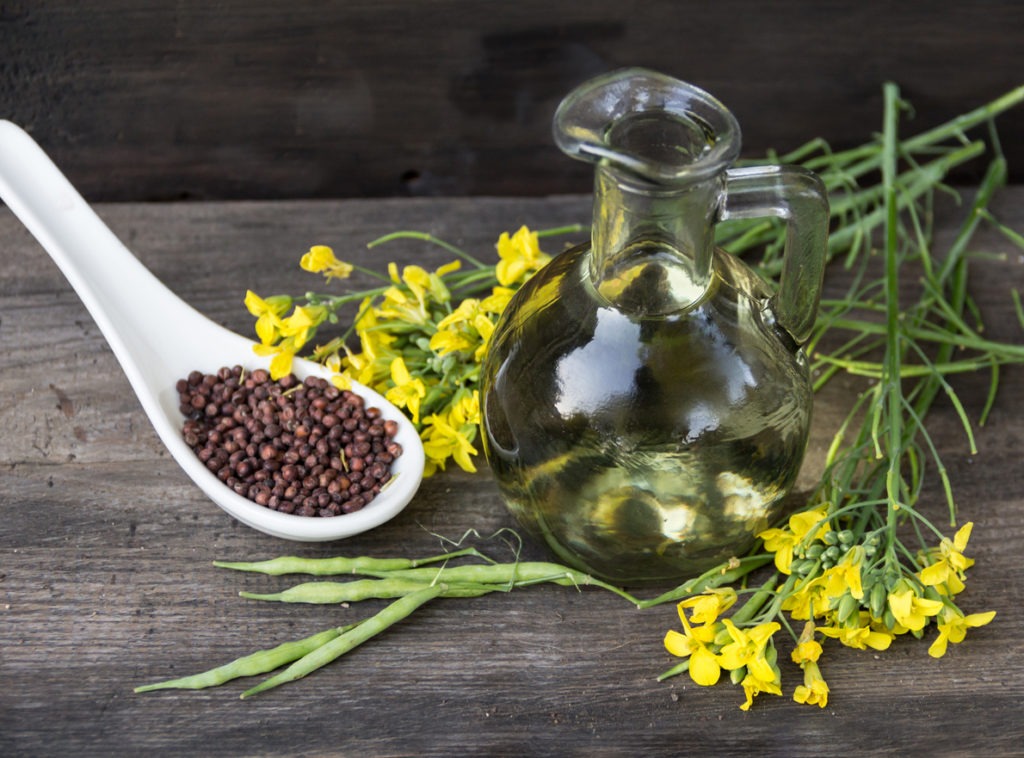What is Canola Oil?

Rapeseed oil comes in two varieties: canola oil for cooking and industrial rapeseed oil. Canola was created by combining Brassica napas and B. Rapa gave rise to the canola cultivar. Canola oil, unlike rapeseed oil, contains very low quantities of erucic acid and is completely safe. The canola oil is extracted from the seeds using a mechanical pressing process for expeller-pressed oil.
Amazing Canola Oil Health Benefits
Because it contains extremely little saturated fat (about 7%), canola oil is typically regarded as a “healthy” oil. Additionally, canola oil has a high concentration of polyunsaturated omega-3 (-3) fat (9–11%) and phytosterols (approximately 0.9% by weight), which inhibit the body’s absorption of cholesterol. All of these heart-healthy fats have been shown to lower the risk of cardiovascular disease and are crucial for the growth and development of the human brain. Vitamins A and K, which are crucial for a healthy body, are abundant in canola oil. Additionally, this oil is believed to support healthy blood sugar levels and strong bones.
Canola Oil for Healthy Cooking
Almost all cuisines may be prepared using canola oil as a cooking medium. It is a tasteless, odorless, and inactive fat. Consequently, the oil won’t change the dish’s final flavor. Canola is widely used since it is affordable and has a high smoke point for deep frying, stir frying, roasting, grilling, and as a suitable alternative for baking. You can use it as a marinade, glaze, or salad dressing.
Canola oil has no allergy risk because it is a neutral oil.
Amazing Canola Benefits for Hair and Skin
Canola oil can be used topically in addition to being used in cooking due to its adaptability. The anti-inflammatory effects of canola oil are beneficial. It works well as a body oil and for massaging sore muscles or joints. On dry or rough skin, this can be used as a moisturizer as well. And canola oil has made it simple for people with frizzy, dry, itchy, and flaky hair to find a solution to their terrible hair day issues.
Canola Oil Products
1. Cooking Oil
One ingredient that you must keep in your pantry is canola oil. Its smooth texture and taste make it ideal for stir-frying, roasting, pan-frying, sear-frying meat, sautéing, baste-baking, and other similar cooking methods.
2. Margarine
Margarine made from canola oil is a dairy-free substitute for butter that works well for frying, baking, and spreading. Polyunsaturated and monounsaturated fats, which are considered “healthy” fats, are present. Saturated fat can be replaced with these types of fats to help lower low-density lipoprotein or “bad” cholesterol.
3. Cooking Spray
With its neutral flavor, canola oil spray will improve cooking while letting the flavor of the dish come through. It makes it simple to cover pans and cooking surfaces to help prevent food from sticking. This is perfect for preparing eggs, pancakes, roasting, barbecue, grilled cheese sandwiches, baking casseroles, and cooking meat, fish, and vegetables in the oven and on the stovetop.
4. Butter
In comparison to ordinary butter, butter made with canola oil has fewer saturated fats and no trans fatty acids, but it has the same number of calories and total fat. It contains a lot of healthy elements, including butyrate and conjugated linoleic acid. It gave cooked meats and vegetables a richer flavor.
5. Cleansing Oil
Canola oil increases skin suppleness, decreases skin inflammation, and soothes skin irritation. While keeping skin hydrated and successfully removing even waterproof makeup, the cleaning oil was developed by dermatologists. It also clears out clogged pores like blackheads and whiteheads and it eliminates pollution, and dead skin.
6. Toning Lotion
Essential fatty acids, which are abundant in canola oil and improve skin tissue strength and hydration, are also found in significant concentrations. Toning lotion serves as an exfoliant and moisturizer. It is a crucial step in holistic skincare regimen because it gets rid of everything that was left on the skin after washing, including makeup, extra oils, pollutants, dead skin cells, and even cleanser residue.
7. Shampoo
Because it contains fatty acids, canola oil has many positive effects on the hair and scalp. The antioxidants in the substance can clean the hair and stop UV deterioration. With its moisturizing qualities, canola oil helps to hydrate the scalp and provide relief from dry, irritated scalp, thereby preventing the development of dandruff.
8. Liquid Hand Soap
Organic Canola Oil contains a high concentration of vitamin E and omega-3 fatty acids. Vegan liquid hand soap has a creamy lather and is incredibly nourishing and hydrating. It has a silky feel, is light, and swiftly absorbed. Because it is made from plants, it is suited for all skin types.
9. Sunscreen Spray
Even the most delicate skin can be protected from the sun by using sunscreen spray, which is moisturizing and chemical-free. The oil and fatty acids in the sunscreen, which are antioxidant-rich, increase the skin’s suppleness and shield it from environmental aggressors in addition to instantly hydrating it. Vitamins E and K found in canola oil may be able to help with skin conditions like acne and aging skin, including lines and wrinkles. The skin’s sensitivity to free radicals can be lessened and protected by vitamin E.
10. Hair Oil
Canola oil moisturizes and softens the hair while restoring dull hair, repairing hair follicles, and enhancing blood flow to the scalp. It maintains a healthy scalp and hair, reduces hair loss, may protect against UV rays, makes hair shine more, and avoids dryness. The majority of hair types respond well to canola oil.
Conclusion
Make sure the canola oil you purchase is organic and expeller or cold-pressed if you want to benefit from its health-promoting properties. Because some canola oils are partially hydrogenated, chemically processed, and genetically modified, which can all have negative health effects. Make it a habit to carefully study the label of any product you intend to purchase, paying particular attention to the contents and manufacturing processes.